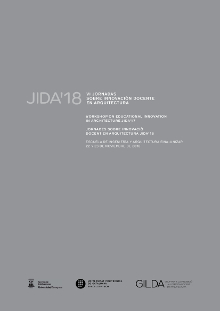Pedagogical antipodes: How to teach architectural projects at the end of the world?
DOI:
https://doi.org/10.5821/jida.2018.5429Abstract
The Inverse Projectual Process is presented as a didactical element that evidences the intention of the project teachers, of the southernmost architecture school on the planet, to place project criticism as an essential element in the teaching of architectural workshops. The methodological experience studied is developed in the course that establishes just the middle of the career syllabus, at which time the relationship between intervention and critical autonomy of teachers and students must be balanced. Being in an condition of extreme geographical isolation, the critical study of the work (first completed and then in making) it constitutes a source of knowledge that cannot be acquired in the immediate context. For this, a provisional and flexible scaffolding of architectural criticism has been established that allows the development of different levels of study, analysis and synthesis of the architecture in question.References
AMANN, B. (2014). La crÃtica poética como instrumento del proyecto de arquitectura. Tesis doctoral. Madrid: Escuela Técnica Superior de Arquitectura de Madrid, UPM. <http://oa.upm.es/32217/> [Consulta: 10 de enero 2015].
BARROS DI GIAMMARINO, F. (2018). “Estado crÃtico. TeorÃa y CrÃtica del Proyecto en Chile (1989 a la actualidad)â€. En 4ENTHA Cuarto Encuentro Nacional de TeorÃa e Historia de la Arquitectura. Antofagasta, Chile.
CHEVALLARD, Y. (1991). La Transposición didáctica. Del saber sabio al saber enseñado. Buenos Aires: Aique Grupo Editor.
MABARDI, J-F. (2012). MaestrÃa del Proyecto. Apuntes para la práctica de la enseñanza del proyecto. Concepción: Ediciones UBB.
MARTÃ, C. (2009). Prólogo. En VACCHINI, L. Obras maestras. Barcelona: Gustavo Gili.
MARTÃNEZ, A; LOIS, S. (2017). “Creatividad y pensamiento crÃtico†en JIDA’17 V Jornadas sobre Innovación Docente en Arquitectura. Sevilla. Disponible en <http://revistes.upc.edu/ojs/index.php/JIDA/article/view/5251> [Consulta el 2 junio 2018].
MAZZEO, C; ROMANO, A. M. (2007). La enseñanza de las disciplinas proyectuales. Buenos Aires: Nobuko.
MIES VAN DER ROHE, L. (1938). Conferencia de ingreso en el Armour Institute of Technology. en NEUMEYER, F. (1995). Mies van der Rohe. La palabra sin artificio. Reflexiones sobre la arquitectura 1922 /1968. Madrid: El Croquis Editorial.
MIRANDA, A. (2013). Arquitectura y verdad. Un curso de crÃtica. Madrid: Cátedra.
MIRANDA, A. (1999). Ni Robot ni Bufón. Manual para la crÃtica de arquitectura. Madrid: Cátedra.
MONTANER, J-M. (1999). Arquitectura y CrÃtica. Barcelona: Gustavo Gili.
ORTEGA Y GAZZET, J. (1985). Meditaciones sobre el Quijote. Ideas sobre la novela. Madrid: Espasa Calpe.
SCHÖN, D. (1988). El profesional reflexivo: Cómo piensan los profesionales cuando actúan. Barcelona: Paidós.
¬TODOROV, T. (1984). CrÃtica de la crÃtica. Madrid: Páidos, (2005).
VIGOSTKI, L. S. (1926) PsicologÃa pedagógica. Buenos Aires: Aique Grupo Editor, (2001).



















